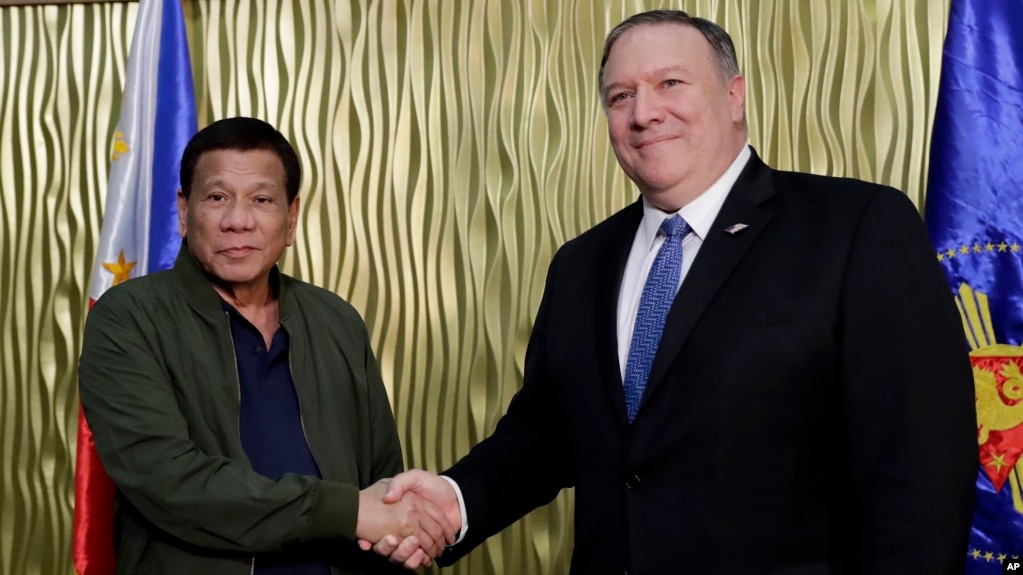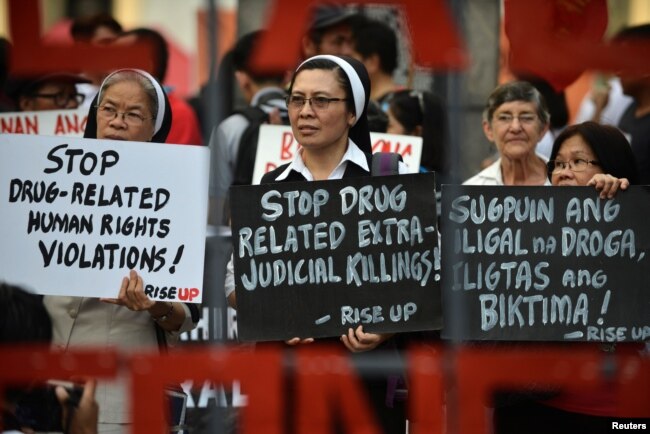
Talks on expanding U.S. aid for the Philippine fight against terrorism in its restive southland would help bring the two countries closer after a fractious period marked by Manila’s new friendship with Beijing, analysts said.
The U.S. Department of State sent a representative to Manila this week to discuss a three-year program that would help local officials pick out and solve problems that might spark extremist reactions among Muslims around the southern island of Mindanao.
U.S. officials held “productive meetings with our Philippines partners on countering violent extremism and supporting our enduring alliance,” tweeted Denise Natali, assistant secretary of state for conflict and stabilization.
Additional aid for countering extremists, including Islamic State backers, will bring the Philippines and the United States closer after three years of questions raised by Philippine President Rodrigo Duterte’s friendship with China and public condemnations of U.S. assistance.
“The military and security relations with the U.S. continue despite the so-called turn of the administration to China, so our military and intelligence officials are still working closely with the U.S. military and security experts,” said Maria Ela Atienza, a University of the Philippines political science professor.

The U.S. Department of State sent a representative to Manila this week to discuss a three-year program that would help local officials pick out and solve problems that might spark extremist reactions among Muslims around the southern island of Mindanao.
U.S. officials held “productive meetings with our Philippines partners on countering violent extremism and supporting our enduring alliance,” tweeted Denise Natali, assistant secretary of state for conflict and stabilization.
Additional aid for countering extremists, including Islamic State backers, will bring the Philippines and the United States closer after three years of questions raised by Philippine President Rodrigo Duterte’s friendship with China and public condemnations of U.S. assistance.
“The military and security relations with the U.S. continue despite the so-called turn of the administration to China, so our military and intelligence officials are still working closely with the U.S. military and security experts,” said Maria Ela Atienza, a University of the Philippines political science professor.

FILE - Catholic nuns hold placards as they protest against what organizers say are drug-related extrajudicial killings, during International Human Rights Day in Manila, Philippines, Dec. 10, 2016.
Testy US ties
The Philippines and former colonizer United States have lived by a mutual defense treaty since the 1950s. Duterte, upset over U.S. challenges of his deadly anti-drug campaign, threatened in late 2016 to cancel a visiting-forces pact with the United States and the following year scaled back annual joint U.S.-Philippine military exercises.
Also in 2016, the year Duterte took office, China, the chief U.S. rival in Asia, pledged $24 billion in aid and investment in the relatively impoverished Philippines. Manila in turn muted criticism of Beijing over a maritime sovereignty dispute that had the two nations at odds before 2016.

Testy US ties
The Philippines and former colonizer United States have lived by a mutual defense treaty since the 1950s. Duterte, upset over U.S. challenges of his deadly anti-drug campaign, threatened in late 2016 to cancel a visiting-forces pact with the United States and the following year scaled back annual joint U.S.-Philippine military exercises.
Also in 2016, the year Duterte took office, China, the chief U.S. rival in Asia, pledged $24 billion in aid and investment in the relatively impoverished Philippines. Manila in turn muted criticism of Beijing over a maritime sovereignty dispute that had the two nations at odds before 2016.

Relatives of soldiers who were killed in the five-month siege of Marawi city in southern Philippines by the Islamic State group-aligned fighters, lay white roses at the Marawi Memorial pylon to commemorate its 2nd anniversary, May 23, 2019.
Joint anti-terrorism work
Despite his furor, Duterte did not challenge U.S. advisers stationed in Mindanao since 2002 to detect terrorist threats.
Violence involving Muslim rebels has killed about 120,000 in the south since the 1960s. Muslims who reached the Philippines some 500 years ago believe the government and Christian majority control an outsized share of resources.
U.S. technical aid particularly helped Philippine troops beat an IS-supported Muslim rebel group in a five-month civil war in 2017.
President Duterte, a native of Mindanao, vowed after his inauguration to seek peace in the south. He spearheaded a law last year giving limited autonomy to about 4.3 million people in part of Mindanao. But the law faces dissent in outlying islands controlled by the Abu Sayyaf rebel group, known for kidnapping and beheading tourists.
And in Marawi, a city partly destroyed in the civil war, displaced people are growing restless about reconstruction work, Atienza said. Too much discontent could give new rise to antigovernment extremists, said Enrico Cau, Southeast Asia-specialized associate researcher at the Taiwan Strategy Research Association.
The three-year program discussed this week in Manila follows an increase in U.S. funding and troops for the Philippines, Cau said. It also shows a new U.S. focus on socio-economic issues, such as lack of employment, that may drive people to extremism, he said.
“There is change of strategy,” Cau said. “From an entirely military effort, they are shifting towards a more civilian oriented effort. They are getting closer to the population.”

Joint anti-terrorism work
Despite his furor, Duterte did not challenge U.S. advisers stationed in Mindanao since 2002 to detect terrorist threats.
Violence involving Muslim rebels has killed about 120,000 in the south since the 1960s. Muslims who reached the Philippines some 500 years ago believe the government and Christian majority control an outsized share of resources.
U.S. technical aid particularly helped Philippine troops beat an IS-supported Muslim rebel group in a five-month civil war in 2017.
President Duterte, a native of Mindanao, vowed after his inauguration to seek peace in the south. He spearheaded a law last year giving limited autonomy to about 4.3 million people in part of Mindanao. But the law faces dissent in outlying islands controlled by the Abu Sayyaf rebel group, known for kidnapping and beheading tourists.
And in Marawi, a city partly destroyed in the civil war, displaced people are growing restless about reconstruction work, Atienza said. Too much discontent could give new rise to antigovernment extremists, said Enrico Cau, Southeast Asia-specialized associate researcher at the Taiwan Strategy Research Association.
The three-year program discussed this week in Manila follows an increase in U.S. funding and troops for the Philippines, Cau said. It also shows a new U.S. focus on socio-economic issues, such as lack of employment, that may drive people to extremism, he said.
“There is change of strategy,” Cau said. “From an entirely military effort, they are shifting towards a more civilian oriented effort. They are getting closer to the population.”

FILE - U.S. President Donald Trump speaks with Philippines President Rodrigo Duterte during the dinner marking ASEAN's 50th anniversary in Manila, Philippines, Nov. 12, 2017.
Duterte-Trump ties
Duterte’s friendly November 2017 meeting in Manila with U.S. President Donald Trump eased his earlier bristliness toward Washington, said Ramon Casiple, executive director with the Philippine advocacy organization Institute for Political and Electoral Reform in Metro Manila.
The Philippine leader also wants to craft a multicountry foreign policy rather than rely on a single power, he added. Around Southeast Asia, countries normally look to China for trade and investment aid and to the United States for military support.
“The key element of that policy is to be friends to all,” Casiple said. “I think President Duterte and President Trump have very good relations.
https://www.voanews.com/a/counterterrorism-aid-us-philippines/4949565.html
Duterte-Trump ties
Duterte’s friendly November 2017 meeting in Manila with U.S. President Donald Trump eased his earlier bristliness toward Washington, said Ramon Casiple, executive director with the Philippine advocacy organization Institute for Political and Electoral Reform in Metro Manila.
The Philippine leader also wants to craft a multicountry foreign policy rather than rely on a single power, he added. Around Southeast Asia, countries normally look to China for trade and investment aid and to the United States for military support.
“The key element of that policy is to be friends to all,” Casiple said. “I think President Duterte and President Trump have very good relations.
https://www.voanews.com/a/counterterrorism-aid-us-philippines/4949565.html

No comments:
Post a Comment
Note: Only a member of this blog may post a comment.